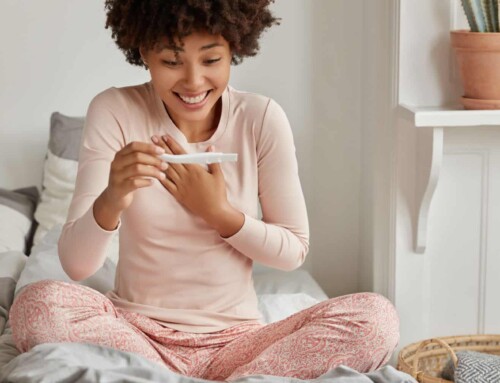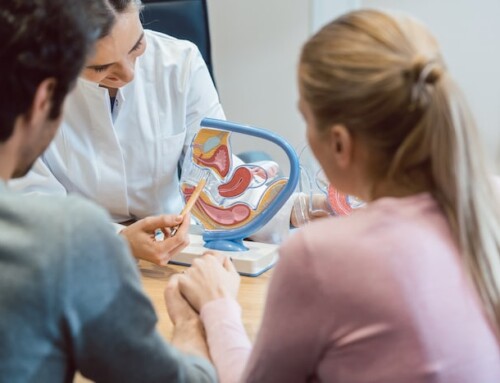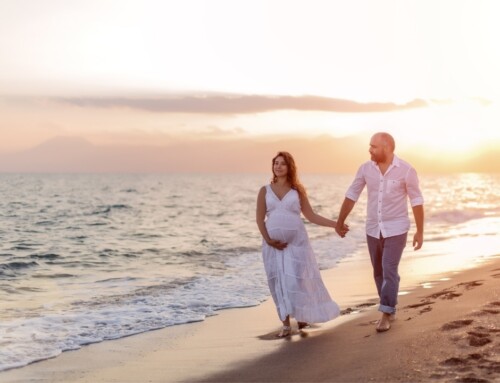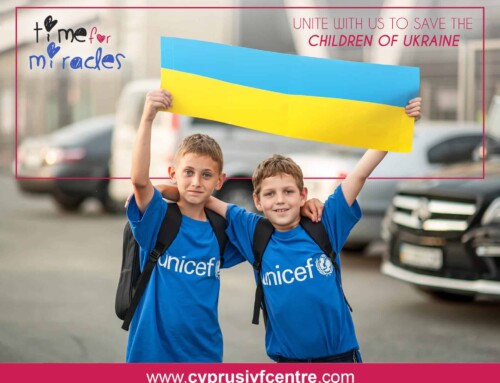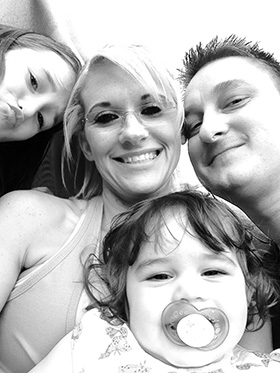
It is often the way in life that sometimes things happen when you least expect them – and sometimes they don’t. And that was exactly the way it happened for Rachel.
Growing up, she assumed that she would have children in the same way that most people do. It was something that could happen in the future – if she wanted it to. A lot – if not most – women assume that the choice to have babies is something which rests in their hands and is entirely within their control. But yet statistics tell us that one in every six couples will have problems conceiving; this is not an isolated issue. And it’s one which fell with full force upon Rachel when she was barely out of her teens.
“I was young, only just twenty, when I was first told I might have problems conceiving,” she explains.
“I was diagnosed with unexplained infertility and to be honest it was a bit of a bombshell. Myself and my husband weren’t planning on having kids just then, but it definitely gave us something to think about for the future. So in that way, we always knew that it was likely we’d need IVF treatment. We weren’t scared, we just accepted it.”
And possibly because the spectre of IVF had not presented itself as a solution to an existing problem, Rachel and her husband Jamie didn’t worry about it. It was there, in the background, to be thought about as and when they needed it.
So a few years later, the signs that would alert others to pregnancy didn’t even occur to Rachel. She felt tired all the time and vaguely sick. Not like she was going to vomit but an underlying nausea that never quite seemed to go away. And no period. For weeks. A visit to the GP for blood tests ruled out pregnancy and Rachel naturally assumed it was the menopause.
“I didn’t worry,” she says. “Why would I? I knew that I was infertile, plus I was on the Pill, just to be sure. I knew this was an early menopause.”
A week and a half later her mother insisted that she do another pregnancy test and to Rachel’s disbelief – it was positive. Her GP sent her for a scan immediately, which revealed that she was 12 weeks and 3 days pregnant.
“To say it was a shock is an understatement!” she says. “I could not believe it. Not only did I think that I couldn’t conceive, but we were also using contraception. Babies just weren’t something that we were thinking about then.”
Despite this, Isabel was born in June the following year. The pregnancy went smoothly but afterwards Rachel suffered with post-natal depression and delayed any decision about siblings for Isabel.
“It wasn’t until Isabel was four that we considered having any more.”
And in a complete reversal of the previous time, Rachel and Jamie assumed they would conceive naturally. It had happened before, so why not again? But it didn’t happen like that. Months passed with no success and eventually they sought help from their GP. Tests were carried out and it was discovered that Jamie had fertility issues. A natural conception looked very unlikely, almost impossible, but when they began to investigate IVF they discovered that they weren’t eligible for it on the NHS because they already had a child. That of course meant that in order to try IVF at all, they would have pay for it privately and it was at that point that they began to consider IVF abroad.
“The clinic in the UK was very negative,” Rachel says.
“We discovered that my egg reserves were very low and the clinic weren’t supportive. We felt kind of dismissed and like they thought it was so unlikely we would conceive. There was no support or positivity at all.”
Uninspired, the couple began researching other options.
“We did a lot of online research. We came across the fertility forums and read through a lot of details on a few so we could get the whole picture of what IVF abroad would offer us.”
And it was during this research that they noticed Team Miracle at the Cyprus IVF Centre kept coming up time and time again and not only this, but they were very highly recommended. Every woman speaking of their experience with Team Miracle in Cyprus praised them. Led by our doctors, Team Miracle seemed like an option worth exploring.
“We hadn’t really ever considered having IVF treatment abroad. I suppose we were just more comfortable with the idea that in would be carried out in Britain. You know, you’re familiar with the hospitals and things and we didn’t know much about any language barriers over there.”
All completely normal concerns, but the more they read about Team Miracle at the Cyprus IVF Centre the more convinced they became that this was the answer for them. It was the same procedure, carried out in immaculate clinics with the only female obstetrician in the whole of Cyprus. Costs were reduced and procedures to boost the chances of conception were available over there which aren’t in Britain.
However, despite their confidence in the Cyprus IVF Centre and Team Miracle, they were still cautious.
“I spoke to Team Miracle for about three years before we went over there. We wanted to make sure that it was the right choice for us, plus we wanted to save enough money to have two cycles of IVF treatment if we needed it – and we also wanted them to get to know us as a couple. IVF is a very personal treatment.”
But as well as that, there was another issue.
“Because of the fact that my egg reserves were very low, I wanted a back-up plan,” Rachel explains. “So Team Miracle recommended the tandem cycle treatment for me.”
Unavailable in the UK, the tandem cycle IVF treatment is a highly successful method of essentially increasing the chances of conception by using a number of donor eggs as well as your own. For Rachel this seemed a perfect solution – she was desperate for another baby and the combination of her eggs plus donor eggs was ideal. Her husband, however, was not so sure. For him it was more difficult to accept the idea of a baby that was possibly not genetically his wife’s, but gradually he came around to the idea. And Rachel was happy that they were able to choose their donor.
“I was so relieved that we could choose our donor. Doctors matched us with a list of donors and we could choose from their profiles which seemed like the best match for us. It sounds silly but we wanted to have someone with dark hair and someone who we felt like we could be friends with in a different world.”
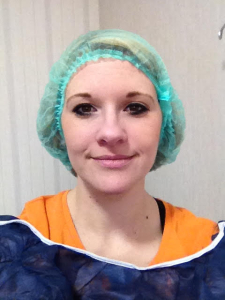
The donor they selected was twenty-four years old. There are strict rules about IVF in Cyprus, designed to ensure only very high-quality eggs are harvested. Donors must be under twenty-five years old and are subject to a battery of medical tests before they are accepted onto the egg donation programme.
“I was completely happy that doctors and Team Miracle would look after us at the Cyprus IVF Centre,” she says. “We did wait a long time before travelling over there because there were so many things that we wanted to get right.”
By the time they travelled to Cyprus for their IVF treatment, Rachel and Jamie had been trying to conceive for almost eight years. The situation this time round could not have been more different to her first, surprise, pregnancy.
The tandem cycle treatment that they opted for means that as well as the patient undergoing the IVF process, so does the donor. The menstrual cycles of both women are brought completely in sync with one another. They are given the same drugs and same scans on the same days in a strict schedule. It crossed Rachel’s mind that she might actually get to see her donor.
“Because we were doing exactly the same things in exactly the same place, I did wonder whether I would see her,” she explains.
“In some ways it would have been nice, but it never happened – even though we must have been in the same clinic within a matter of hours of each other.”
Team Miracle of course are highly professional. This includes being familiar with, and adept at, anticipating any potential issues that a patient may have and there are rules and procedures in place to protect the interests of both parties at all times.
As the IVF process got underway, Rachel began taking drugs to thicken the lining of her endometrium to create the best possible conditions for the tiny blastocyst to be transferred into. In all, seven eggs were harvested from Rachel and 15 from the donor. The egg retrieval she had been worried about, thinking that it may be painful, but actually it wasn’t painful at all.
“There was a bit of discomfort, but it didn’t hurt.”
So whilst Rachel’s body prepared to receive the precious bundle of DNA, somewhere else the blastocysts were being created. A blastocyst is a name for the structure which is formed in the early development of the embryo. It is the inner ball of cells that then goes on to develop into a foetus.
Transfer day for the blastocyst was day 5 of development. On that day Rachel attended the clinic and to her delight, a top-quality, grade A blastocyst developed from her eggs was transferred to her uterus, along with three donor blastocysts. Throughout the transfer, Doctors shared the whole procedure with Rachel, as she lay there.
“It was amazing. Doctors showed me each embryo on the ultrasound as they were placed inside and that’s a vision that I can still see now. She was so reassuring and so confident that I would be pregnant.”
And so began the two weeks wait.
This two-week wait goes down as one of the most legendary periods of nature among those women hoping that they are pregnant. During this time the blastocyst will burrow into the wall of the uterus and by day 11 or 12 it will be firmly buried in the endometrium and pregnancy will result. Or it fails to implant and menstruation occurs in a bitter disappointment. Whichever way the IVF result goes – it happens during the two weeks after transfer.
An anxious Rachel then waited in Cyprus with Team Miracle for two days after the transfer.
“I didn’t want to fly,” she told me. “I don’t know why, I know statistically it wasn’t going to make any difference but it was just instinct. So we stayed for two extra days and then flew home.”
They arrived back in Britain safely but just days later, disaster struck. Rachel fell ill with a sickness bug, vomiting day and night. For her, it was the stuff of nightmares.
“After everything we’d gone through, all the careful planning, the hopes, the hard decisions, the travel, the money – it suddenly looked like it was all going to be wasted because of a freak chance of nature,” she explains.
Certainly it is easy to see how she felt. There is little more unpleasant than spending days throwing up at any time, but when you’re willing your body desperately to nurture a tiny ball of cells to the best of its ability, a stomach virus turns the situation from unpleasant to deathly unpleasant. There’s nothing to be done however, so Rachel just had to wait it out. Over in Cyprus, Team Miracle at the Cyprus IVF Centre reassured her that the illness wouldn’t make a difference to her IVF treatment – somewhat difficult to believe when you feel so ill.
But throughout this two week period Rachel and Jamie never felt alone. Team Miracle checked in regularly.
“I never felt alone,” Rachel says. “The safe feeling that you get from Team Miracle in Cyprus continues at home and even to this day.”
A test at the end of the two week wait revealed that the IVF treatment in Cyprus had been successful. Despite the illness and worry, Rachel was pregnant with her much longed-for second child. Further blood tests at days 12 and 14 confirmed the success and Team Miracle made a special phone call to congratulate them.
Everything then went smoothly until fifteen weeks when she suffered a sudden bleed.
“Obviously I was terrified at the time, blood to me just meant miscarriage, but thankfully it didn’t last long.”
Rachel’s pregnancy continued with no further problems.
“It was great, I absolutely loved it,” she says. “It was such a longed-for baby that I was determined to enjoy every second, and I did.”
And two minutes after midnight on the 6th November 2013 Rachel and Jamie’s IVF baby was born. A little girl, a sister for Isabel. She’s called Phoebe, a beautiful name from Greek mythology for a very special little girl. Rachel and Jamie don’t know if she belongs genetically to Rachel or not, but to them it is a complete non-issue.
“My body nurtured her and without me she wouldn’t be alive, so whether she came from donor eggs or my own makes absolutely no difference – she’s my child in all possible ways.”

